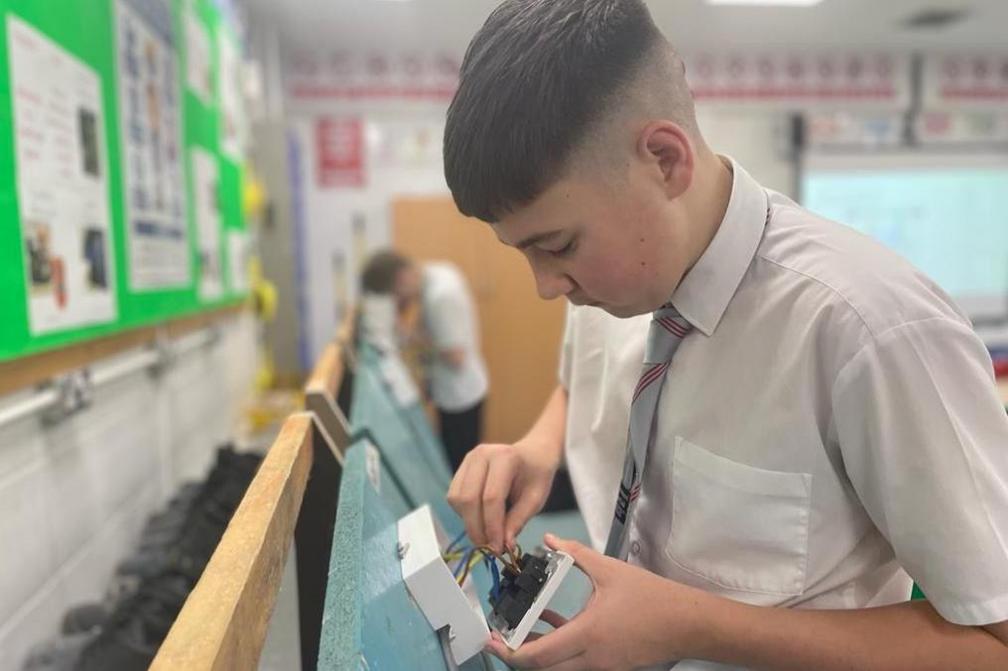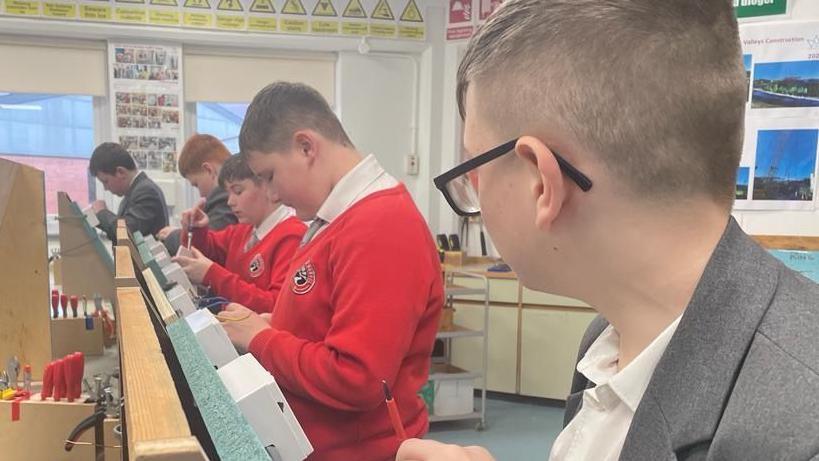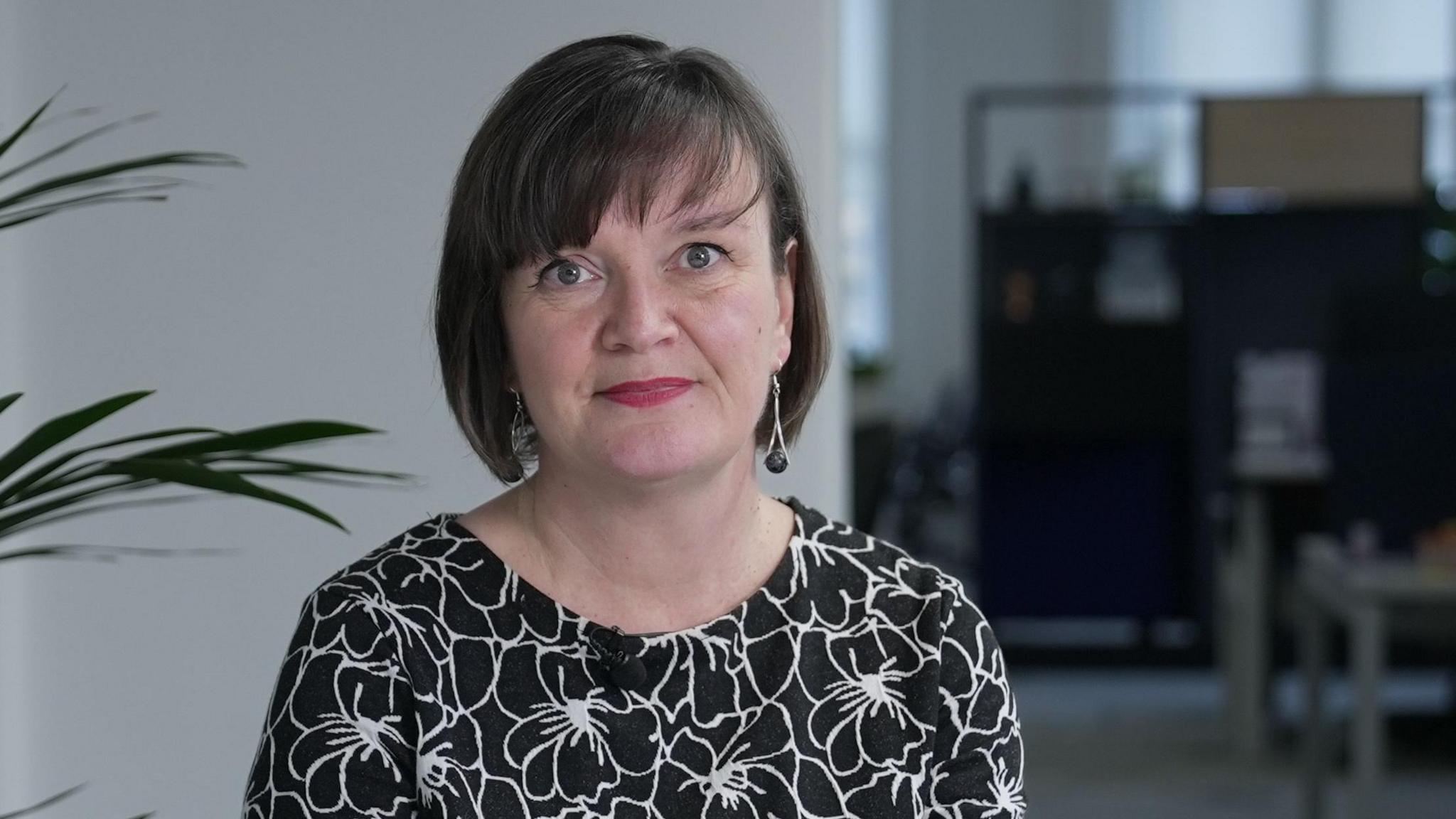You've heard of GCSEs, so what are VCSEs?

The new qualification will focus on "practical" skills geared towards certain jobs and careers
- Published
Many will be familiar with GCSEs but pupils in Wales could soon be also able to study a new qualification.
The Vocational Certificate of Secondary Education (VCSE) will be introduced from September 2027 for 14 to 16-year-olds.
The changes, part of a major reform to fit the new schools curriculum, will mean pupils at this age will no longer take the current work-related courses such as BTEC.
Qualifications Wales, external said it hoped VCSEs would become as recognised a brand as GCSE and “valued in the same way”.
What are VCSEs?
VCSEs will be a new brand of vocational qualifications.
These are more practical and tend to be geared at certain jobs or careers.
They are a different to general qualifications like GCSEs which are usually awarded in academic subjects.
Currently, there are a lots of different qualifications and the aim is to simplify what’s on offer and bring them all under one name.
There will be between 13 and 16 VCSE titles in total which can be offered by more than one awarding body.
Qualifications Wales said these would replace around 300 current vocational qualifications including BTECs.
But BTECs will still be offered to post-16 students.

Cassy Taylor of Qualifications Wales says VCSEs will have an equivalent value to GCSEs
Cassy Taylor, director of qualifications reform and policy at Qualifications Wales, says it's important for young people to have choices “that are valued equally”.
“We’re really excited about the concept of a new VCSE brand that sit side by side with GCSEs and really raise the profile of vocational learning in schools," she said
What do pupils and teachers think?

The construction course is a popular choice at Idris Davies school at Abertysswg in Caerphilly county.
At Idris Davies school in Abertysswg, Caerphilly, the construction course is a popular option for pupils.

Ella, 14, says construction "is a really useful skill to have"
The course, especially the electronics part, appealed to Ella, 14, because she has always enjoyed helping her mother with DIY at home.
“I thought I was quite good at it, so I thought I’d give it a go and I’m really enjoying it.
“I helped my mum with the electrics in the house, changed a few sockets and all that.
“It’s just a useful skill, but yeah, it is really fun to do,” she added.

Leo, 13, says he wants to be a bricklayer
Thirteen-year-old Leo wants to work in the construction industry when he's older.
“I feel like I’d rather do construction than history or something, because I want to be a bricklayer and hopefully by picking construction I’m able to do bricklaying when I’m older”, Leo said.
“It's physical. You don’t have to sit down or write in a book or anything. It’s fun as well.”

Teacher Darren Lynch says course will appeal to wide range of pupils
The construction course covers brickwork, carpentry, electrical installation and tiling, and appeals to a wide range of pupils according to lead teacher Darren Lynch.
“Unfortunately there’s sometimes a little bit of snobbery with the construction topic which is completely unfounded.
"Yes we have pupils here with additional learning needs, we have pupils who are mainstream, we also have lots of more able and talented pupils who access these courses".
Headteacher Richard Owen insists courses such as construction can help keep pupils engaged with school-work.
He welcomes any reform that reinforces the message that vocational qualifications are of equal value to more academic ones.
But he says running vocational qualifications can be costly because of the equipment and materials needed.
“It’s well worth that investment,” he said.
“But it is something, as we get tighter and tighter in terms of finance in education that becomes increasingly in our mindset in terms of how many vocational courses we can offer in schools.”
What else is changing?
Other changes include introducing:
A range of foundation qualifications - for pupils not ready yet to take GCSEs and are in quite broad areas that fit in with the areas of learning and experience in the new curriculum including humanities and the expressive arts.
Skills qualifications - made up of bitesize units either under the heading of skills for life or skills for work and cover areas including financial literacy, practical gardening, applying for jobs and customer service.
There will also be a personal project qualification which can be completed on a subject of choice to test skills such as planning and creativity.
The changes mean that the Welsh Baccalaureate and Skills Challenge Certificate would no longer be offered at this level.
Why is this happening?
The qualifications watchdog has already set out changes to GCSEs in Wales.
The latest announcement is about the other qualifications for 14 to 16-year-olds.
The aim is to make sure qualifications fit in with the the new curriculum.
But Qualifications Wales said it is also simplifying what’s offered and making sure they reflect what skill young people need in life and work and also what employers want.
Some of the new GCSEs start being taught in September 2025 and others in 2026.
The new vocational qualifications will be introduced the following year.
What do employers think?

Louise Mumford from broadband company Ogi says it will 'breathe a new fire' into education
At Cardiff-based broadband provider Ogi, staff said that skills and experience count for more when they’re recruiting than particular qualifications.
Louise Mumford, the company’s learning and development manager, says the reforms could “breathe a new fire into the Welsh educational dragon”.
As well as VCSEs she said the changes recognised important skills like mental health and work readiness – “skills that we all need, but we’ve kind of taken them for granted”.

Chris Walker from Ogi says he benefited from "hands-on" training
Chris Walker, a field engineer with the company, said while most of his family took an academic route, he decided to take “a more practical role”.
“You can prepare for a lot of stuff in a classroom environment, but I feel from my experience you get your hands on everything while doing," he said.
“I found vocational training is the most beneficial for me”.
Which courses will be offered in my school?
Schools will decide on the menu of qualifications they want to offer their pupils, steered by any Welsh government guidance.
But there will be questions around the workload for teachers who will have to familiarise themselves with new qualifications.
Schools will also be sensitive to any additional costs.
Although they are already used to offering vocational qualifications alongside GCSEs they will now have to offer a different range of options.
Cassy Taylor from Qualifications Wales said qualifications already change over time and they would work with awarding bodies “to make sure that they provide really excellent resources for teachers to support them and deliver the new qualifications”.
Unlike GCSEs, which are almost all run by the WJEC exam board in Wales, vocational and other qualifications are offered by dozens of different awarding bodies.
Qualifications Wales says it expects many of these awarding bodies to offer the new VCSEs.